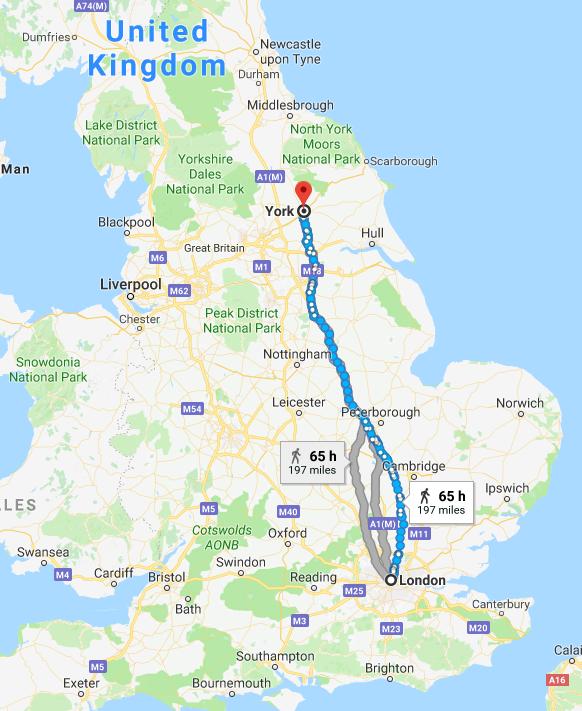York-London Horse Race April 12, 2018
Author: Beach Combing | in : Modern , trackbackThis story comes out of Kirby’s Wonderful Museum, vol IV, p. 359. Kirby claimed to have extracted it from a 1618 publication, The Abridgement of the English Chronicle. We are back to stupid sport bets.
In this moneth [but which year?], John Lepton of Kepwick, in the county of Yorke, Esquire, a gentleman of an ancient family there, and of good reputation, his majesties servant, and one of the groomes of his most honourable privy chamber, performed so memorable a journey as I may not omit to record the same to future ages, the rather for that I did heare sundry gentlemen, who were good horsemen, and likewise many good physiciaons affirme it was impossible to be done without danger to his life.
And the challenge
He undertook to ride five severall times betwixt London and Yorke in sixe days, to be taken in one weeke, between Monday morning and Saturday following:
London the great city of southern England, York the old capital of the north. Just to give the modern data on this it is 209 miles by road according to Google Maps. On a modern road it would take, again according to Google, four hours and ten minutes by car. On foot Google estimates that it would take 65 hours to cover the 197 miles necessary for a pedestrian.
He began his journey upon Monday, being the 20th day of May, betwixt two and three of the clocke in the morning, forth of S. Martin’s, neere Aldergate, within the city of London, and came into Yorke the same day, betwixt the hours of five and six in the afternoon, where he rested that night;
Sixteen hours then.
the nexte morning, being Tuesday, about three of the clocke, he took his journey forthe of Yorke, and came to his lodging in S. Martin’s aforesaid betwixt the hours of six and seven in the afternoon, where he rested that night:
Sixteen hours.
the next morning, being Wednesday, betwixt two and three of the clocke, he tooke his journey forthe of London, and came unto Yorke about seven of the clocke the same day, where he rested that night:
Seventeen hours.
the next morning, being Thursday, betwixt two and three of the clocke, he took his journey forthe of Yorke, and came to London the same day, betwixt seven and eight of the clocke, where he rested that night:
Eighteen hours.
the next morning, being Friday, betwixt two and three of the clocke, he took his journey towards Yorke, and came thither the same day, betwixt the hours of seven and eight in the afternoon, so as he finished his appointed journey (to the admiration of all men) in five days, according to his promise;
Eighteen hours.
and upon Monday, the 27th of this moneth, he went from Yorke and came to the court at Greenwich, upon Tuesday the 28th, to his majesty, in as fresh and cheerful a manner, as when he first began.
An important data point that is missing here is whether or not John changed his horse during the journey: I take it as an absolute given that the same horse did not do the five runs! Beach has looked previously at horse times and a good guide is the Tevis Cup where a horse races to cover a hundred miles: eleven hours has been done. In short, either John changed horse along the route or this is simply impossible. Other views: drbeachcombing gmail DOT com Be interesting to learn more about the quality of the road from London to York.
24 Apr 2018, Bruce T: It’s a poor comparison, Beach. The Tevis ascends the Sierra Nevada. Is there a near eight thousand feet steep climb anywhere between York and London? On narrow trails where the mount has to be led for long steep sections because it can’t handle a riders weight? Where you risk it bolting over the mountainside due to horses being notoriously skittish if you’re fool enough to ride it on the dicey stretches? Our hero was riding on long established roads from York to London where he could average ten-twelve miles an hour and really make hay on the long levels. A man that spent his life in the saddle, who changed horses regularly, could have done it if the weather was good that week. The fifteen hours seems tight, but eighteen hours is well within the realm of possibilities. He would have to change horses, with a run like that he would have ran a single horse into the ground. One final note, with the lack of accurate clocks in the period, and different localities going by customary times, I wouldn’t marry myself to the times reported. The claim in difference of three hours on the first and last runs could be simple fatigue, or a device used by the writer to make it seem more realistic to later audiences.



